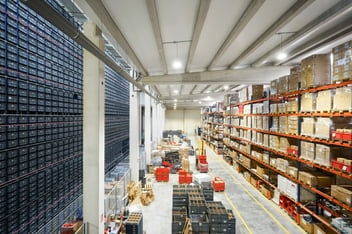Discover the ideal storage solutions for your business and optimize your operations
Understanding the Importance of Efficient Storage Solutions
Efficient storage solutions play a crucial role in the success of any business. Whether you are a small startup or a large corporation, having a well-organized storage system is essential for smooth operations. With efficient storage solutions, you can maximize your available space, improve inventory management, and enhance overall productivity.
By implementing efficient storage solutions, businesses can minimize the time and effort required to locate and retrieve items. This leads to significant time savings and increased efficiency in day-to-day operations. Moreover, efficient storage solutions help reduce the risk of damage or loss of inventory, ensuring that valuable goods are properly stored and protected.
Furthermore, efficient storage solutions contribute to a safer working environment. With organized storage areas, the risk of accidents and injuries is reduced, as employees can easily navigate through the space without obstacles or clutter. This promotes a more productive and secure workplace for everyone.
In summary, understanding the importance of efficient storage solutions is crucial for businesses looking to optimize their operations. By implementing a well-designed storage system, businesses can improve inventory management, increase efficiency, reduce risks, and create a safer working environment.
Different Types of Storage Solutions for Businesses
When it comes to storage solutions for businesses, there are various options available to suit different needs and requirements. Here are some of the most common types of storage solutions:
1. Warehousing: Warehousing services provide businesses with dedicated storage space for their inventory. This is an ideal option for businesses that require large-scale storage and regular access to their goods. Warehousing services often include inventory management, order fulfillment, and distribution services.
2. Self-Storage: Self-storage facilities offer businesses the flexibility to rent storage units based on their specific needs. These facilities provide secure, individual units that can be accessed by the business as and when required. Self-storage is a popular choice for businesses that need temporary or seasonal storage solutions.
3. Pallet Racking: Pallet racking systems are designed to maximize vertical storage space by using specially designed racks to store goods on pallets. This type of storage solution is commonly used in warehouses and distribution centers, allowing businesses to efficiently store and retrieve goods using forklifts or other lifting equipment.
4. Shelving Systems: Shelving systems are versatile storage solutions that can be customized to fit the specific needs of a business. They are often used in retail stores, offices, and small businesses to store items such as documents, supplies, and products. Shelving systems come in various sizes and configurations, including wall-mounted shelves, freestanding units, and mobile shelving systems.
5. Automated Storage and Retrieval Systems (AS/RS): AS/RS systems utilize advanced technology, including robotics and computerized controls, to automate the storage and retrieval of goods. These systems are highly efficient and can handle large volumes of inventory with minimal human intervention. AS/RS systems are commonly used in industries with high-density storage requirements, such as manufacturing and distribution.
These are just a few examples of the different types of storage solutions available for businesses. Each option has its own advantages and considerations, so it's important to assess your business needs and consult with storage solution providers to find the best fit for your specific requirements.
Benefits of Outsourcing Storage Solutions
Outsourcing storage solutions can bring numerous benefits to businesses. Here are some key advantages:
1. Cost Savings: Outsourcing storage solutions eliminates the need for businesses to invest in their own storage facilities, equipment, and personnel. This can result in significant cost savings, especially for small businesses or those with limited storage needs. By outsourcing storage, businesses can allocate their resources more efficiently and focus on core competencies.
2. Scalability: Outsourced storage solutions offer scalability, allowing businesses to adjust their storage space as per their changing needs. Whether you need to expand or downsize your storage capacity, outsourcing provides the flexibility to adapt quickly without the hassle of acquiring or disposing of physical space.
3. Expertise and Support: Storage solution providers specialize in managing and optimizing storage operations. They have the necessary expertise, experience, and infrastructure to handle various storage requirements effectively. By outsourcing to professionals, businesses can benefit from their knowledge and support, ensuring efficient and reliable storage solutions.
4. Improved Efficiency: Outsourcing storage solutions allows businesses to streamline their operations and focus on their core activities. With a dedicated storage provider handling inventory management, order fulfillment, and logistics, businesses can save time and resources, leading to improved overall efficiency.
5. Reduced Risk: Storage solution providers often have robust security measures in place to protect stored goods. This helps mitigate the risk of theft, damage, or loss of inventory. Additionally, outsourcing storage solutions can also minimize the risk of operational disruptions due to unforeseen events, such as natural disasters or equipment failures.
In conclusion, outsourcing storage solutions offers cost savings, scalability, expertise, improved efficiency, and reduced risk for businesses. It allows businesses to leverage specialized storage services and focus on their core competencies, leading to enhanced productivity and growth.
Key Factors to Consider When Choosing Storage Solutions
Choosing the right storage solutions for your business is crucial to ensure optimal efficiency and effectiveness. Here are some key factors to consider:
1. Storage Needs: Assess your business's storage requirements, including the type and volume of inventory, frequency of access, and any specific storage conditions or regulations. This will help determine the most suitable storage solution for your needs.
2. Space Utilization: Evaluate the available space in your facility and consider how different storage solutions can maximize storage capacity while allowing for efficient movement and accessibility of goods. Optimize space utilization to minimize costs and improve workflow.
3. Security: Consider the security measures provided by storage solution providers. Look for features such as surveillance systems, access control, fire prevention systems, and insurance coverage to ensure the safety and protection of your inventory.
4. Scalability: Anticipate your future storage needs and select a storage solution that offers scalability. This will allow your business to grow and adapt without the need for frequent changes or disruptions to your storage system.
5. Cost: Evaluate the costs associated with different storage solutions, including rental fees, maintenance expenses, and any additional services or fees. Consider the overall value and return on investment provided by each option.
6. Service and Support: Research the reputation and track record of storage solution providers. Look for providers who offer reliable customer support, responsive communication, and additional value-added services such as inventory management or order fulfillment.
By carefully considering these key factors, you can make an informed decision and choose the storage solutions that best align with your business goals and requirements.
How to Implement the Perfect Storage Solution for Your Business
Implementing the perfect storage solution for your business involves a systematic approach. Here are some steps to guide you through the process:
1. Assess Current Storage System: Evaluate your existing storage system, including its strengths, weaknesses, and areas for improvement. Identify any bottlenecks or inefficiencies that need to be addressed.
2. Define Storage Objectives: Clearly define your storage objectives based on your business needs. Consider factors such as inventory management, space utilization, accessibility, and security.
3. Research Storage Solution Providers: Research and shortlist storage solution providers based on their reputation, expertise, and the availability of suitable storage options for your business.
4. Consult with Providers: Engage in discussions with the shortlisted providers to understand their offerings, capabilities, and pricing. Seek their advice and expertise to determine the most suitable storage solution for your business.
5. Conduct Site Visits: Visit the facilities of the selected storage solution providers to assess their infrastructure, security measures, and overall suitability. This will help you make an informed decision based on actual observations and firsthand experiences.
6. Evaluate Contracts and Agreements: Review the contracts and agreements provided by the chosen storage solution provider. Ensure that the terms and conditions align with your requirements and that there are no hidden costs or limitations.
7. Implement and Monitor: Once you have selected a storage solution provider, work closely with them to implement the chosen storage solution. Monitor the implementation process and regularly evaluate its effectiveness to make any necessary adjustments or improvements.
By following these steps, you can implement the perfect storage solution for your business, optimizing your operations and ensuring efficient storage and management of your inventory.





Leave a Comment